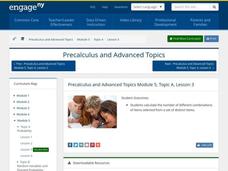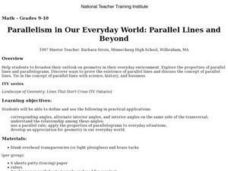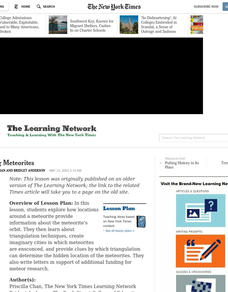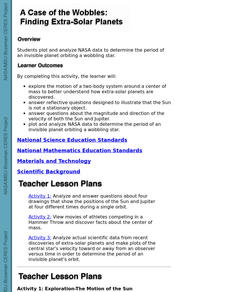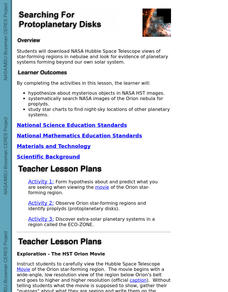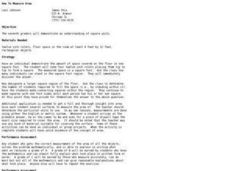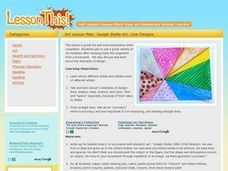EngageNY
Coordinates of Points in Space
Combine vectors and matrices to describe transformations in space. Class members create visual representations of the addition of ordered pairs to discover the resulting parallelogram. They also examine the graphical representation...
Curated OER
Distance in Space
Sixth graders explore space science by measuring distances between planets. In this solar system lesson, 6th graders view a Bill Nye video and discover the conversion between the metric system and imperial measuring systems. Students...
Curated OER
Exploring the Sky: Reading Maria's Comet
Discover the science behind astronomy. After reading the book Maria's Comet, which is about a young woman who breaks new ground by becoming a female astronomer, young learners practice reading comprehension with...
Curated OER
The Webb Space Telescope: Detecting Dwarf Planets
In this detecting dwarf planets worksheet, students read about the Webb Space Telescope that will be launched in 2014 to detect dwarf planets using an infrared telescope. Students solve 3 problems and create a graph for each using given...
Curated OER
Algebra: Mirror, Mirror on the Universe
Students assess how algebra, telescopes, space exploration and optics are so important in astronomy. They encounter studies on the Hubble Space Telescope, Hubble Deep Field and how algebra helps to determine the effects of contamination...
Laboratory for Atmospheric and Space Physics
Where Are We Going?
Come take a ride on the space bus! Scholars go on an imaginary trip to pick up their peers from the inner and outer planets while reinforcing math skills. First, learners round decimals to identify each planets' distance from Earth....
EngageNY
Counting Rules—Combinations
Discover how combinations are different from permutations. In the third installment of a 21-part module, scholars learn how to determine combinations of objects. They learn to distinguish between situations where order is important and...
Curated OER
Parallelism in Our Everyday World: Parallel Lines and Beyond
Students broaden their outlook on geometry in their everyday environment. They explore the properties of parallel lines and parallelograms and discover ways to prove the existence of parallel lines and discuss the concept of parallel lines.
Curated OER
Mapping Meteorites
After reading an article, "Cameras Capture a 5-Second Fireball and Its Meteorite's Secrets," space science superstars use the triangulation method to determine the location of a distant object. In-class activities and homework are...
Curated OER
Finding Extra-Solar Planets
Students plot and analyze NASA data to determine the period of an invisible planet orbiting a wobbling star. They explore the motion of a two-body system around a center of mass to better explain how extra-solar planets are discovered.
Curated OER
Captain Invincible and the Space Shapes
Learners identify geometric solids. In this geometric shapes lesson, students listen to the teacher read Captain Invincible and the Space Shapes by Stuart J. Murphy. Learners then visit a web site where they identify types of...
Curated OER
Worksheet 19: Ship Positions
In this math worksheet, students read informational paragraphs and then answer 18 questions using data from their readings. Questions are about vectors, positions, distance and orbits.
Curated OER
Hubble Spies Colliding Asteroids!
In this colliding asteroids activity, students are given the equation to determine the collision time for asteroids. Students use this equation to solve 4 problems including finding the area of a cross-section through the body of an...
Curated OER
My Angle on Cooling
Students explore how the angle and distance of an object can change it's temperature. After reviewing how the position of the Earth affects the temperature of the planet, student groups design and perform an experiment to test how...
Curated OER
Searching For Protoplanetary Disks
Learners download NASA Hubble Space Telescope views of star-forming regions in nebulae and look for evidence of planetary systems forming beyond our own solar system. They hypothesize about mysterious objects in NASA HST images.
Curated OER
Attack of the Raging River
Learners explore mass and volume. In this mass and volume lesson, students pretend to be on a hike and have lost their way. Learners must cross a river get back on track. Students must use mass, volume, surface area, density, property...
Curated OER
How To Measure Area
Geometers learn how to measure the area in square units. They use the floor in the classroom as a visual to measure a square foot area. They use classmates to fill the space and expand the measured area square foot by square foot until...
Curated OER
Stars and Slopes
More of a math lesson than physics or space science, high schoolers take a set of data and plot it on a log-log coordinate system. The write-up for day two was never completed, but day one, "Stars and Slopes," is complex and cohesive....
Curated OER
Joseph Stella Art: Line Designs
Students discover the focal point in pictures and create their own images using lines and space. In this art analysis instructional activity, students create a black dot on a white paper which becomes a focal point for the lines...
Curated OER
Measures of Space I: Lengths and Areas
Students discover how to measure in one and two dimensional space and calculate how much space any object of a given dimension occupies. After a discussion about dimensions, students work with Zome System Creator Kits to build one and...
Curated OER
A Practical Application For Area
First graders investigate the concept of surface area and find the coverage for the surfaces in a building that includes carpet or walls. The application of finding the area is practical using the everyday objects to help them to make...
Curated OER
Measurement
Middle schoolers create two prisms out of the same paper. They calcuate the number of centimeter cubes needed to fill each prism. They discover the concept of volume.
Curated OER
How Do Things Fall?
Students study forces by examining the force of gravitational attraction. They observe how objects fall and measure the force of gravitational attraction upon objects. Students discover that, since gravitational constants are different...
Curated OER
Principles Of Flight: Wings That Spin
Students discover how flight is possible. In this physics lesson, students investigate the properties of a blimp and gyro-copter, comparing rotating wings and fixed wings of aircraft. Students create their own model aircraft...






